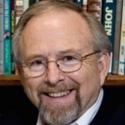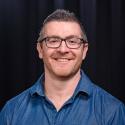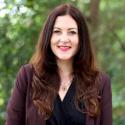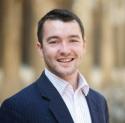2022 Apologetics (Advanced) Network
- Image
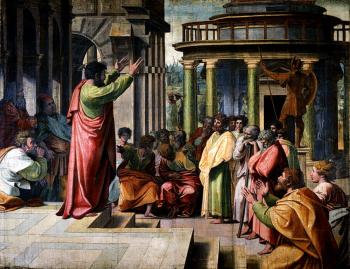
What did the Apostle Paul do when Pre-Christian Europe was pagan, relativistic, and pluralistic? He did apologetics among his contemporaries. Paul went to the Jews arguing from the Old Testament Scriptures that Jesus was the Christ. Paul also went to pagan Greeks and used their literature and cultural artifacts to argue that the "unknown God" has been revealed and proclaimed in Jesus.
21st century Europe is in a state very similar to Paul's time. Just as Paul confronted the marketplace of ideas in his generation, Europe today needs gifted apologists who can demonstrate that Christianity is true and relevant. Therefore, the vision of the European Apologetics Network is to train a new generation of apologists who can stand in today's marketplace of ideas in the way that Paul did in his generation. Our desire is to develop apologists who will testify to the truth of the Gospel with wisdom, versatility, and courage in their efforts to persuade their contemporaries.
Applicants should be those with evangelistic or apologetic gifts who have previously attended the European Leadership Forum Apologetics Network: Foundational Track and the European Evangelism Network. The purpose of the Network is to train, mentor, equip, and resource those evangelists and apologists who are seeking to communicate the Gospel in their local communities. Prior preparation will be set for all applicants.
Applicants should be those with evangelistic or apologetic gifts who have first attended the European Apologetics Network: Foundational Track and the European Evangelism Network. The purpose of the Network is to train, mentor, equip, and resource those evangelists and apologists who are seeking to communicate the Gospel in their local communities.
Network Leadership
Network Speakers
René Breuel was born in São Paulo, Brazil and has lived in Rome, Italy for the past 13 years, where he serves as the Founding Pastor of Hopera, a church in Rome’s university neighborhood. He holds a Master of Studies in Creative Writing from Oxford University in the UK, a Master of Divinity… Read more
Simon Edwards is a speaker and writer. He worked as a lawyer in Australia before moving to the UK to study at OCCA and later Oxford University. Simon has spoken on university campuses, including Oxford, Cambridge, Hong Kong, Oslo, and Queensland; in banks, businesses, and government institutions… Read more
Andrew Fellows was appointed pastor of a church in Bradford, West Yorkshire in 1988 where he served for seven years. In 1995 his family moved to the English branch of L’Abri Fellowship, where they lived and worked for 21 years. From 2011 to 2016 Andrew was the chairman of L’Abri International.… Read more
Stefan Gustavsson is a member of the European Leadership Forum Steering Committee. He is the director for Apologia – Centre for Christian Apologetics and makes his home in Stockholm. He was the founding general secretary for 16 years of the Swedish Evangelical Alliance. Stefan travels widely… Read more
Bruce A. Little has master’s degrees in Apologetics and Religion and a PhD in Philosophy of Religion and a DMin in Apologetics. Presently, he serves as Emeritus Professor of Philosophy and director of the Francis A. Schaeffer Collection at Southeastern Baptist Theological Seminary, where he… Read more
Kristi Mair teaches philosophy, ethics, and apologetics at Oak Hill College in London, UK, where she also provides pastoral support for F students. She holds a degree in philosophy and theology, as well as an MA in philosophy of religion and ethics. She is currently working on her PhD in the… Read more
Tom Price is a lecturer at OCCA The Oxford Centre for Christian Apologetics and was made an Archbishop’s Evangelist in 2019. He has experience and interest in outreach, cultural engagement, Bible teaching, and discipleship. He has degrees in Philosophy and Christian Apologetics and is currently… Read more
Peter S. Williams (www.peterswilliams.com) studied philosophy at Cardiff University (BA), Sheffield University (MA) and the University of East Anglia in Norwich (MPhil), and obtained a masters level Postgraduate Certificate in Higher Educational… Read more
Network Programme
Sunday, 22 May
Apologetics typically grounds itself in the truth that Christianity is reasonable. This talk looks at how meaning provides another important starting point – one that is vital in our engagement with sceptics.
In a time of post-truth, virtue-signaling and relativism, do people even care about truth? When it comes to engaging with our cultural moment, how can we persuasively communicate the truth of Jesus Christ? In this session, we will explore a few philosophical underpinnings before we consider how we can share Jesus in a non-truth culture, where slogans like ‘stay in your own lane’, and ‘you do you’ dominate discussions. How can we engage, expose, enter, and evangelize in seemingly disinterested and apathetic societies? We will also spend time considering how we can share the liberating, life-giving joy of Christ when suspicion, power-plays, and corruption occupy the public imagination.
Monday, 23 May
The Christian faith is founded on the claim that God raised Jesus from the dead. Testimonies about Jesus’ appearances followed closely after the crucifixion and burial of Jesus. A number of individuals, several groups of people and a large crowd are all part of the historical evidence for the resurrection. But how are we to understand what kind of appearances the first Christians experienced? What actually happened during the 40 days following the crucifixion and, in the case of Paul, several years later outside Damascus?
Preaching can often feel predictable and remote from contemporary life. How can our sermons have “bite” and be thought-provoking? Starting with Paul’s debating ministry in Acts, this session will explore how to include contrasts in our preaching, engage current thinkers and trends, address believers and nonbelievers simultaneously, and hold debates with exponents of other worldviews.
Tuesday, 24 May
Taking an interdisciplinary approach to dating the fourth gospel, this session contends that arguments for a pre-70 AD dating based on archaeology and history relating to John 5:2 are unsound, covers recent moves to date the gospel manuscript fragment Papyrus 52 to the late second or third century AD, and investigates the authorship and compositional history of the last gospel.
One of the challenges facing the apologist today is that demonstrating the rationality of the Christian faith does not always lead people to embrace Christianity. Unless people can see that Christianity is practically relevant to their lived experience, as well as morally attractive, they are unlikely to give a fair hearing to the strong arguments for the truth of Christianity. In this session, we will therefore consider the apologetic importance of not only appealing to people’s intellects with arguments and evidence to show that the Christian faith is true; but also of appealing to people’s imaginations with the beauty and relevance of the Christian faith so that they actually want it to be true.
Wednesday, 25 May
Online streaming video is one of the most popular pastimes for people. Movies deal with topics as diverse as transcendence and terrorism. How does cinema overlap with theology in engaging with God and our beliefs? This session explores some of the cinematic commentary in recent films and shows and asks: what is cinema saying? And how can we make use of it and engage with it meaningfully in our outreach?
Defending God is not necessarily the same as loving God. There is an inherent danger in practicing the skills of an apologist. The apologist can be “drawn away from love of the thing he tells, to love of the telling” (C.S. Lewis, The Great Divorce). This session looks at four pertinent necessities to the Christian life that have a direct bearing on those who serve as apologists.


